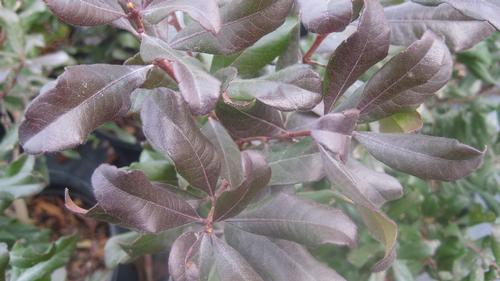Myrica pensylvanica
A cold hardy Myrica with a dense, rounded, form that grows 6 to 8 feet tall. The leaves are grayish-green to dark green, leathery, and glossy, and when crushed they are very aromatic. The undersides of the leaves have yellow resin glands. Leaves turn a splendid maroon purple in the colder months. Plants may be evergreen or semi-evergreen depending on winter temperatures.
Yellowish-green catkins are found on separate male and female plants and are not particularly showy. The female flowers, if pollinated, produce a small grayish-white drupe in late summer that persists until April. Fruits are borne in large numbers as clusters along the stem. They have a scented waxy coating and are used to make bayberry candles, soap, and sealing wax.
Thickets provide cover for wildlife, nesting sites for birds, pollen and nectar for pollinators, and food for birds and small mammals. This plant is particularly resistant to damage by deer.
The northern bayberry is best planted in groups or mass plantings as a border, screen, or hedge. It may be used in woodland gardens, wildlife gardens, along coastlines, or on slopes/banks to help control erosion. It may also be used along highways since it tolerates salt spray.
- Fragrant evergreen to semi-evergreen foliage
- Waxy gray fruit fall through spring
- Excellent native for massing and wildlife
- Category:
Shrub,
Wetland,
Native
- Hardiness Zone: 3-7
- Height: 5-10 ft
- Spread: 5-10 ft
Login for pricing


